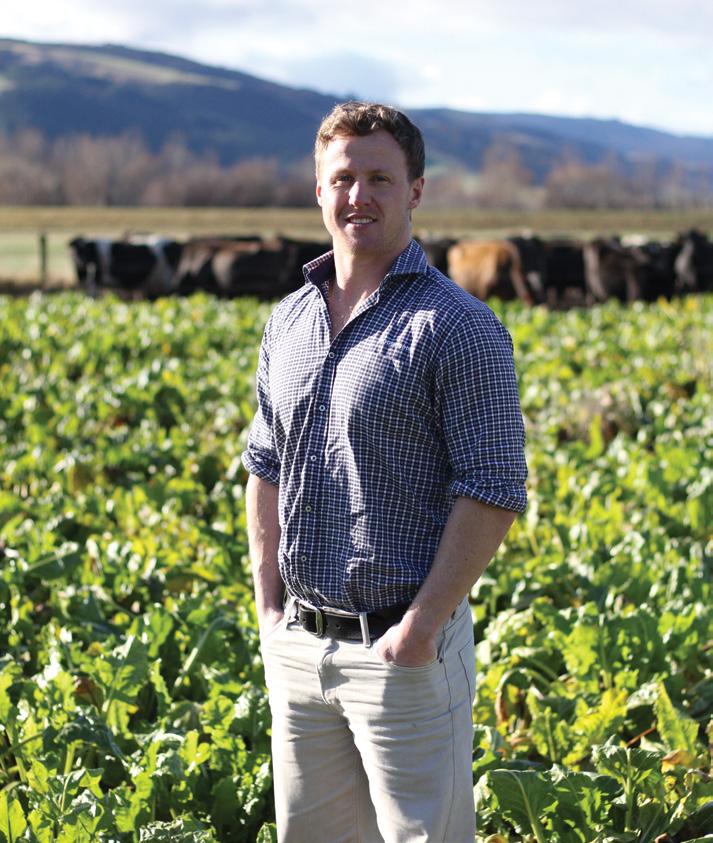
5 minute read
Selling stock takes good relationship
SELLING STOCK TAKES
The more information Brenden Clay has, the better the job he can do for clients. Karen Trebilcock explains why.
renden Clay is in it for the long game as a PGG Wrightson dairy rep based in Southland. After two years in the position, the 31-year-old B said he’s now finding his feet. “I enjoy it. It’s a lot different to what I expected, a lot harder, more cut-throat, but I enjoy building the relationships with my clients and other agents and that’s what makes it work. “It’s about joining the dots for people. We have to have strong relationships with clients and colleagues and I’m starting to build those, and it’s the snowball effect.” The position is salary based with bonuses for targets met. “It’s good for a young person like me starting out. PGG Wrightson have invested in me and given me a shot. The main goal for me now is to add as much value to PGG Wrightson Livestock and my client’s businesses.” Brenden does everything from selling herds to finding young stock grazing, winter grazing for cows, supplying service bulls, selling feeder and weaner calves as well as culls and store stock. When the Covid-19 lockdown happened in March the first thing on his mind was the large number of cows his clients either had sold or still had to sell before moving to a new home come June 1. “Our business was classed as essential, with very strict rules in place for our own safety as well as our clients. “But I had a lot of clients who were stressing that come June their cows needed to be somewhere else.” However, culls eventually got to the works and herds were sold and the weather in April and May was “unreal”, helping it all happen. Coming from a farming family, he knew he was going to Lincoln and did the three-year bachelor of agriculture degree there. “I went to James Hargest College in Invercargill but I spent as much time as possible on farms, crutching lambs in the weekends and milking in the holidays.” His first job out of varsity was as a field rep for the then CRT,
LEFT: Brenden Clay with cows wintering on fodder beet through a PGG Wrightson contract.
and after that he went dairying.
Four seasons of contract milking up to 600 cows in Southland later, he decided on a change of direction and at the same time was asked to apply for a position with PGG Wrightson.
He started as a trainee in January 2018 and by spring that year moved up to be the southern Southland dairy representative, part of a team of nine in the PGG Wrightson’s southern dairy region.
He is in daily contact with the members of the team using WhatsApp and Agonline, and also talks with other PGG Wrightson stock agents throughout the country, such as Murray Bain in Otago.
Brenden said Friesians were popular in the south because of the live heifer export market, and there were also those seeking out A2A2 genetics especially as Open Country Dairy was paying a premium for that milk.
A herd profile was all important when it came to selling.
“A fully recorded herd with good records and herd tests is always the easiest to sell. People want to know everything such as BW and PW, age splits, somatic cells, breed makeup, production per cow and per hectare, inputs.
He said presentation was also key and sometimes waiting a few weeks for a herd to put on a bit more condition made a sale happen.
He said some people chased BW but others were looking for cows with capacity.
Replacing M Bovis herds has kept the price up in the south this year but with that ending the emphasis would be on improving existing herds through sourcing livestock with improved genetics and conformation as well as utilising the opportunities in the live export market, he said.
“We’ve got a robust contract system for the buying and selling of “PEOPLE WANT dairy livestock. It means TO KNOW the money will be paid EVERYTHING and the stock will arrive when they should and SUCH AS BW AND go when they should. We PW, AGE SPLITS, give peace of mind. SOMATIC CELLS,
“Grazing is also a big BREED MAKEUP, part of the business with our grazing contracts PRODUCTION PER helping stock owners and COW AND PER the graziers by outlining HECTARE, INPUTS.” the expectations of each party. We identify any possible issues, and monitoring stock welfare is crucial to the success of a grazing arrangement.”
When he’s not out looking at cows, playing rugby for Wyndham or hunting, Brenden can be found under the water near Bluff or Stewart Island or somewhere in between. And then there’s Doubtful or Milford Sounds in Fiordland, also close by.
With a 5mm wetsuit, weight belt, fins, mask and snorkel he can free dive down to 15m with a spear gun after fish or chasing crays.
However, he says paua are a bit boring – they just sit there.
He has friends with boats but buying his own is on his wish list, and he has no ambition to do a scuba course and gain a PADI certification.
“It would just feel like cheating.”












